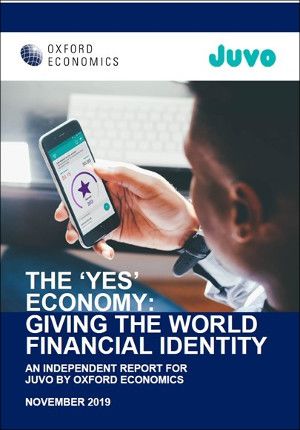Ungated Post | 13 Dec 2019
The ‘YES’ Economy: Giving the world financial identity

More than five billion individuals around the world own and use a mobile phone. This network of mobile phone users stretches far beyond the boundaries of the global financial system. Individuals that have never been granted access to financial services are welcomed into a valuable network of digital participants. The connections they make within that network present a profound opportunity for the financial services sector, as well as for the well being of the world’s recently connected populations.
In this study for Juvo, a pioneer of Financial Identity as a Service (FiDaaS) technology, we found that establishing financial identities for the world’s financially excluded – or "unbanked" – population would add an extra $250 billion to global GDP. That is the equivalent to increasing GDP per capita in low-income countries by 6%, simply from utilising the data already being shared via mobile phone usage.
We explored the implications for household savings, credit and insurance provision of providing the opportunity for a global network of smartphone users, to access financial services for the first time. For a region-by-region breakdown and our assessment of the socio-economic implications of such a scenario, visit the Juvo landing page to read the report in full.
Our economic consulting team are world leaders in quantitative economic analysis, working with clients around the globe and across sectors to build models, forecast markets and evaluate interventions using state-of-the art techniques. Lead consultants on this project were:
Oxford Economics’ team is expert at applying advanced economic tools that provide valuable insights into today’s most pressing business, financial,and policy issues.
To find out more about our capabilities, contact:
EMEA
Sam Moore
+44 (0)203 910 8082
Email
Americas
Hamilton Galloway
+1 (646) 503 3068
Email
Asia
Christie Tang
+852 3974 8841
Email
Related Services

Post
The Economic Footprint of JLR in the UK
This report examines the economic footprint of JLR in the United Kingdom in 2024. The analysis is conducted both at the national level, as well as on the West Midlands and North West regions, where JLR’s main facilities are located.
Find Out More
Post
Airbnb’s Economic Contribution to APAC in 2024: GDP, Jobs, and Regional Impact
Airbnb's platform connects hosts across Asia Pacific (APAC) with travellers from around the world. Oxford Economics was commissioned by Airbnb to quantify its economic footprint in 10 APAC markets in 2024.
Find Out More
Post
Economic Insights: Airbnb’s Contribution Through the Lens of Oxford Economics
Oxford Economics Australia delivered a tailored economic impact assessment for Airbnb, including GDP contribution modelling, job creation analytics, guest‑spend segmentation, and regional tourism dispersion insights to underpin Airbnb’s stakeholder communications and strategic growth initiatives.
Find Out More